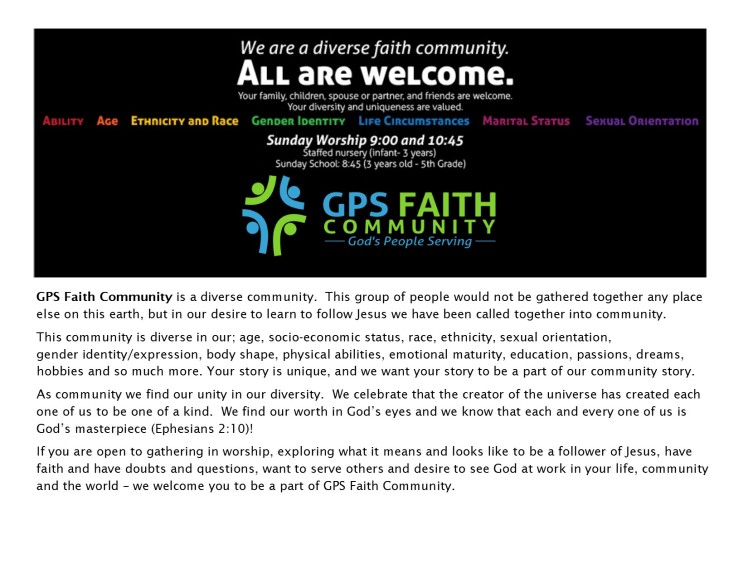By Pastoral Assistant Lisa Short
I don’t know about you, but I could use a little sunshine about now. I heard on the news today that we are in our 10th day of no significant sunshine. It feels longer than that. I find myself turning lots of lights on in the house in an effort to brighten things up. We have a running joke around the GPS office that Mondays are set aside as “whiny Mondays”, a day when we can kvetch about whatever is irritating us. And, yes, we’ve mentioned the lack of sun a several times… My biggest complaint about “whiny Mondays” though is that it isn’t an alliteration. It’d be so much better if it was “whiny Wednesdays.” We’ve tried “mopey Mondays” but we really aren’t that mopey so that doesn’t work. And, really, we aren’t so whiny on Mondays either, but it makes for a good running gag. In general, the office at GPS is a pretty happy place. We laugh a lot, we sometimes eat leftover cookies from Sunday fellowship time if there are any, and we celebrate the blessings of God. Good friendships, good ministries, a good and gracious God – what’s there to whine about anyway?
 Let’s be real, though, there is a difference between good-natured whining and those times when we really are beaten down and life just doesn’t seem to be kind, friendly and fair. That’s when we can draw comfort from one of the most familiar and beloved passages in the New Testament: The Beatitudes. Here they are, from Matthew 5:3-12,
Let’s be real, though, there is a difference between good-natured whining and those times when we really are beaten down and life just doesn’t seem to be kind, friendly and fair. That’s when we can draw comfort from one of the most familiar and beloved passages in the New Testament: The Beatitudes. Here they are, from Matthew 5:3-12,
“God blesses those who are poor and realize their need for him, for the Kingdom of Heaven is theirs. God blesses those who mourn, for they will be comforted. God blesses those who are humble, for they will inherit the whole earth. God blesses those who hunger and thirst for justice, for they will be satisfied. God blesses those who are merciful, for they will be shown mercy. God blesses those whose hearts are pure, for they will see God. God blesses those who work for peace, for they will be called the children of God. God blesses those who are persecuted for doing right, for the Kingdom of Heaven is theirs. God blesses you when people mock you and persecute you and lie about you and say all sorts of evil things against you because you are my followers. Be happy about it! Be very glad! For a great reward awaits you in heaven.”
The Beatitudes present a model of blessing or happiness contrary to what is usually seen in this world. According to the logic of this world, those whom Jesus proclaimed “blessed” are regarded by most as useless, as “losers”. Yet Jesus declares them, declares us, declares the “losers” to be worthy and rewarded. Jesus knows that life isn’t always fair and sunny. He recognizes that there are times when we will be poor, when we will mourn, when we won’t see justice done. He tells us that even during those times we are to remember we are blessed by God. He tells us that God cares during those times. When we are in need of mercy he will be merciful, when we mourn he will comfort us. It takes courage to be happy in the face of hardship and persecution, and no one said it was an easy attitude to adopt! Yet Jesus encourages us to see the blessing, to be happy in the blessing. Why? Because recognizing that we are blessed, particularly when we are in the midst of hardship, changes us. I presented this quote once before, it’s a favorite of mine from author Anne Lamott: she says, “Feeling that we have been blessed makes us feel expansive and light. It makes us generous. We make a little gasp of surprised appreciation when we feel grateful to someone, and this gives us more breath, which connects us back to life, where we now have plenty to share.” Blessing, happiness, gratitude, delight, life.
Maybe Jesus knew what he was talking about (you think???) when he said “be blessed” in both the trials and the happy times in life. I think not so much because it means we’ll get a reward someday but because it changes how we see the world today. Changing how we look at the world will allow us to see it with more beauty, more joy, and more gratitude. I can learn from the Beatitudes and changing how I look at the world, particularly on Mondays, will make the tiny ‘whiny Monday’ kvetches very, very tiny indeed!



 We know the story of the birth of Jesus and the manger and Mary and Joseph and the shepherds, right? In the church year the 12th day after Christmas (you know, the one where your true love brings you Twelve Drummers Drumming, Eleven Pipers Piping, Ten Lords a Leaping…) is the day we typically focus on the importance of the 3 wise men. This day is called “Epiphany”, meaning “revelation”, because it was the day that the wise men revealed to the world that Jesus was the promised king.
We know the story of the birth of Jesus and the manger and Mary and Joseph and the shepherds, right? In the church year the 12th day after Christmas (you know, the one where your true love brings you Twelve Drummers Drumming, Eleven Pipers Piping, Ten Lords a Leaping…) is the day we typically focus on the importance of the 3 wise men. This day is called “Epiphany”, meaning “revelation”, because it was the day that the wise men revealed to the world that Jesus was the promised king.